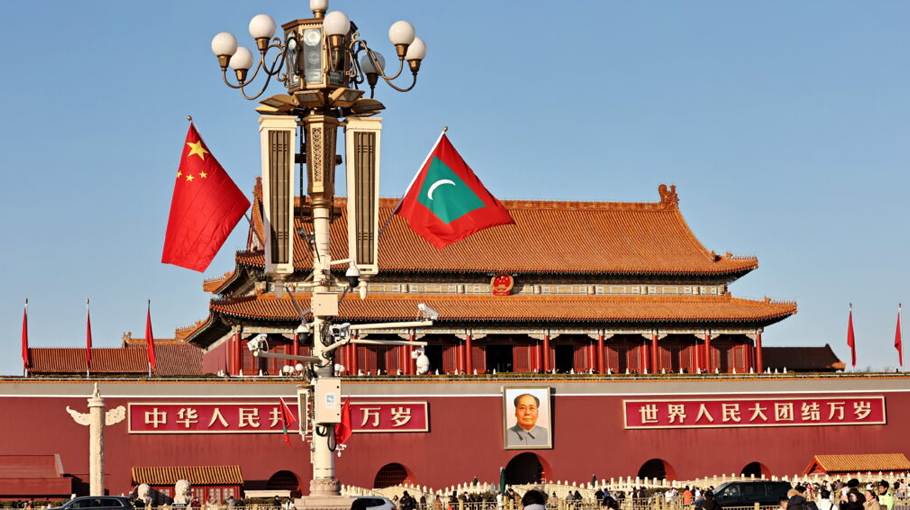Balancing internal and external obligations in the Maldives’ foreign policy

In Maldives, domestic politics is often significant enough to supersede foreign influence and privilege independent approaches to development cooperation. President Dr Mohamed Muizzu aims to maintain internal support as he strengthens relationships with foreign nations.
Since it attained independence from Britain in 1965, the Maldives’ foreign policy has been based on principles of sovereign equality of states, the rules-based international order, non-interference in other states’ internal affairs, diplomacy in problem-solving and friendly relationships with other states.
Maldives has made significant progress in democratic governance, making the transition to a multi-party democracy in 2008, and economic development, the country’s rich tourism industry now generating 80 per cent of national revenue. In 2021, Maldives was put in the high human development category in the Human Development Index.
But Maldives has continued to encounter economic challenges due to global market changes, health crises such as COVID-19 and climate change. To stay on its development path, it needs foreign aid. As a result, the demand for foreign partnerships to aid mega infrastructure development investments has increased. This has created geopolitical competition between major donors, who all want to become the most preferred partners.
But viewing the Maldives’ foreign partnerships through the lens of geopolitical competition fails to incorporate the domestic politics and public attitudes shaping the country’s foreign policy direction. Instead, it raises suspicions over the security implications of the Maldives’ foreign affairs.
From 2013–2018, China invested in multiple mega infrastructure projects in Maldives including building the first bridge over the ocean to connect the capital city, Malé, the international airport and second largest residential island Hulhumalé. Despite the bridge’s domestic benefits, at the regional level China’s economic expansion in Maldives made India anxious. The Maldives’ policies potentially pave ‘the way for China to establish its military presence in the Maldives’ and undermine India’s regional role in maintaining rules-based order.
This strategic narrative is countered by the claim that the Maldives–China relationship was ‘a milestone in the development of China–Maldives economic and trade relations’. Former president Abdulla Yameen’s defeat in the 2013 election was not primarily due to his China policy. Public support was instead lost due to alleged corruption, which created distrust in the debt generated by China’s investment. After his election defeat, Yameen was arrested on charges of money laundering.
Maldives has made significant progress in
democratic governance, making the transition to a multi-party democracy
in 2008, and economic development,
the country’s rich tourism industry now generating 80 per cent
of national revenue. In 2021, Maldives
was put in the high
human development category
in the Human Development Index
Yameen’s successor, former president Ibrahim Mohamed Solih, followed an ‘India-First Policy’ from 2018–2023. India provided debt relief funds and aided mega infrastructure development projects including building a mega-bridge to connect Malé, Villimalé and two other islands. But India’s expanding diplomatic presence in Maldives was not received well by the public by the 2023 election. An opposition’s ‘India out’ campaign gained public support when their claims about India’s alleged influence in Solih’s government and the presence of a small Indian military contingent in Maldives were not well countered by Solih. The presence of this military contingent contributed to Solih’s election loss.
But Maldives–India relations have not privileged the military-security interests of India. Maldives and India have had military-security cooperation since 1988 and maritime security-focussed joint exercises, including the Dosti trilateral exercise, since the 1990s. Military cooperation with countries other than India, such as the United States, Australia and Japan, has been important for Maldives’ national security.
Solih’s loss cannot be attributed solely to India’s military presence. Public disappointment about the lack of investment outcomes, such as India’s incomplete bridge work, at the end of Solih’s five-year term also aided the opposition’s campaign against his policies.
Muizzu took office in November 2023 with an election promise to address concerns about India’s alleged influence, starting with a request to India to withdraw its military. After he took office, the first country Muizzu visited was Turkey rather than India, which may signal an attempt to steer away from a traditional ally. But a continued diplomatic row between the two countries could have made their mutual engagements bumpy.
Despite this initial wariness, Muizzu has adopted an inclusive ‘national development approach’, including continued closer ties with India after his meeting with Indian Prime Minister Narendra Modi on the United Nations COP28 meeting’s sidelines. Muizzu has also continued partnerships with traditional development and security partners, including the United States, Australia and the United Kingdom.
Asserting that the Maldives is too small to be ‘entangled in this so-called geopolitical fight between bigger nations’, Muizzu has committed to working with all countries, focussing on mutual trust and benefits. With this policy, China is ‘expected to make huge inroads in Maldives’. The twenty key agreements signed in Muizzu’s visit to China in January 2024 indicate a potential increase of China-aided projects.
Muizzu’s government will continue to maintain public support if its domestic and foreign affairs continue to respect the Maldives’ national security, sovereignty and the rights of its people. Understanding domestic interests can benefit ongoing mutually beneficial partnerships.
Athaulla A Rasheed is PhD candidate at the Department of Pacific Affairs, The Australian National University.
Source: East Asia Forum




